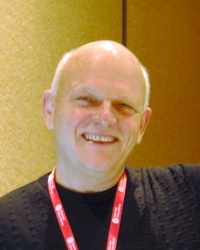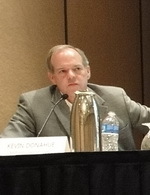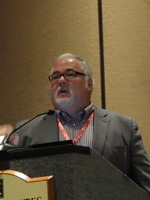15 October 2011
Hotel Lawyer from CMBS Special Servicer heaven with the latest insights from the Dallas Lenders Conference
For 11 years now, Steve Van and his team at Prism Hotels have held what is probably the best lender conference in the country. Attendance is by invitation only. The one-day program is attended by industry leaders and about 100 of the Who’s Who of the hotel lending world. If you are a special servicer, you want to be at this meeting. The convocation has swelled in size from about 35 at the first meeting, but Steve resists all the temptations to grow too large so that this remains an informal meeting place for serious dialog and candid discussion.
Generally, the conference delegates include the top people from the major special servicers, such as Midland Loan Services, C-III Asset Management, CW Capital, Berkadia Commercial Mortgage, ORIX Capital Markets, KeyBank Real Estate Capital, Bank of America and the like – all the people you would like to see but never find at the major investment conferences. The sessions are highly interactive, more akin to think tank sessions and sharing of experiences and concerns than the typical conference lecture format.
I was privileged to lead a panel of thought leaders on “Trends in Hotel Loan Sales,” and Guy Maisnik (my partner and vice chair of our Global Hospitality Group®) spoke on the panel “Special Servicers Survival Guide for Loan Defaults – CMBS 201: What has changed?”
Here are some highlights of the meeting that I thought were noteworthy . . .
 Steve Van welcomes his guests to “Fishing for Solutions 2011 — Prism Hotels’ high-powered, by invitation-only lender conference in Dallas, held October 13, 2011.
Steve Van welcomes his guests to “Fishing for Solutions 2011 — Prism Hotels’ high-powered, by invitation-only lender conference in Dallas, held October 13, 2011.Steve Van’s 10 thoughts for the industry
Steve Van’s warm welcome to long-time industry friends was punctuated with some tough realism:
More than 2/3 of the CMBS loans coming due have already been extended and cannot be extended further because of limitations in the PSA (Pooling and Servicing Agreement that governs all the CMBS loans in a particular pool).
In addition to the PSA limitations on how many loan extensions can be granted, there is also an express absolute prohibition on any extensions being granted beyond the life of the pool. Many pools are now approaching their end of life.
PIP (property improvement program) pressures will force borrowers and lenders to act. By and large, the brands have been lenient on maintaining their brand standards since the meltdown started. But many hotels needed upgrades then, and little has been done for almost 3 years. The brands are near the end of their patience, and will enforce PIPs. They don’t care anymore if hotels can’t cover operating costs, much less debt service.
For FelCor Chairman Thomas J. Corcoran’s optimistic keynote address at the conference, see Hotel Lawyer with optimism for the hotel industry from at the Dallas Lenders Conference, Fishing for Solutions 2011.
And for Kris Hudson’s Wall Street Journal article on the conference, see FelCor Chairman: Decline of Hotel Stocks Ignores Industry’s Results
Special Servicer panel interchange

Kevin Donahue of Midland moderating a Special Servicer panel with Michael O’Hanlon of Berkadia, Tom Biafore of Kilpatrick Townsend, and Clark Rogers of KeyBank.
One of the most interesting panels from my perspective was led by Kevin Donahue of Midland. Michael O’Hanlon of Berkadia, Tom Biafore of Kilpatrick Townsend, and Clark Rogers of KeyBank were also on the panel.
Here are some extracts from that panel that I found intriguing.
On the backlog of distressed loans
Clark Rogers, KeyBank: The pace of workouts is exceeding the pace of transfers. There is still a backlog of large loans. But absent another economic shock, I expect the volume of workouts to decline and normalize in 3-5 years. We are seeing a definite improvement but lot of external factors could change all this. There are so many external factors.
Michael O’Hanlon, Berkadia: We have seen a dramatic reduction in transfers. Our resolutions are outpacing transfers, excluding large floaters. People were able to secure some decent financing in the window up until August. A lot of loans in special servicing were liquidated through full pay offs, and liquidation. But now, we are starting to see contracts fall out mainly due to lack of financing. Hopefully will see that open up next year again.
The floaters are coming
O’Hanlon: Although conduit loans are reducing by number, there are some huge mega-loans (many billions) that are getting to the point where they have to be worked out. Then we have the floaters. They are all ending their 3 year extension period. They will be back in special servicing because no one can get financing. These loans are at 70 bp and don’t work at 3 or 4%
Donahue: It is sad when you say a loan does not work at 3% interest! . . . The floaters will be a challenge. They were all on shorter terms. They have a lot of challenges. Even though it might be in the interest of the trust to extend these loans again, there are many that cannot be extended any more.
O’Hanlon: There are big floaters. There will all be in default. There is no way to get rid of them other than to take huge losses.
Donahue: The documents are not well structured. No one thought about what happens in this case. I would estimate that up to 60 or 65% of the loans coming due now will be floaters. Most of these loans are pegged to LIBOR, without a floor. They have avoided default because it is almost free money. In order of magnitude, there are $50-60 billion in floaters coming due, and hotels probably represent 25-30% of floaters.
 Kevin Donahue, head of special servicing at Midland Loan Services, said that people want to be optimistic but keep looking over their shoulder for something bad to happen. In this environment, he said that hotel RevPAR today should stand for “Really exuberant voices Predicting A Recovery.”
Kevin Donahue, head of special servicing at Midland Loan Services, said that people want to be optimistic but keep looking over their shoulder for something bad to happen. In this environment, he said that hotel RevPAR today should stand for “Really exuberant voices Predicting A Recovery.”Rogers: The hotels with floaters are the trophy stuff in gateway markets. There is tremendous demand for this product.
When does the outlook brighten and the economy improve?
Rogers: I am not sure we ever got out of the recession. We saw a lot of liquidity that came from the government. That liquidity created optimism. We have to see meaningful employment growth and solve the housing problem to get out of this. The international volatility also creates uncertainty. I don’t see where the jobs come from. I see this being a long, drawn out process.
O’Hanlon: I think we will be status quo through 2012 and 2013. It may be 2014 or 2015 before we can hope to see anything different.
Donahue: It is all about jobs and consumer confidence. Bloomberg was quoting that less than 90 days ago a large bank in Belgium would not need bailout. Today it took $100 million bail out. It is the same in the hotel sector. We don’t see an increase in distress levels, but don’t see a decline.
Clark: What if Europe blows up? A large percentage of NY occupancy is from Europe
O’Hanlon: Corporations have more cash now than ever, but all companies are cutting back on expenses, travel, marketing, hiring. Some markets are doing well, but others are not so great.
Donahue: It is all about the lack of certainty. Until that is resolved, there will not be improvement in commercial real estate.
What is happening to the flow of distressed hotel loans? Watch out for the “floaters.”
Experience varies among the servicers. Generally 2011 has been a year when resolutions have exceeded the pace of new transfers of distressed loans. The improved liquidity and financing available in the first part of 2011 through August helped special servicers sell distressed assets to all cash buyers.
The special servicers who “kicked the can down the road” or played “extend and pretend have been vindicated. They have increased their stakeholder’s returns significantly and now look like “geniuses.” Maybe they are, and maybe all the grousing comes from frustrated buyers who were denied all that upside that patience preserved for the lenders who waited.
There is something like $80 billion of CMBS loan maturities coming due in the next two three years. Many of those loans cannot be extended any longer. Many of the new maturities are floating rate CMBS loans or “floaters” with interest rates near zero.
Special servicers expect to see a significant influx of distressed loans starting in early 2012. The big question is whether this will create buying opportunities the opportunistic investors have been expecting for almost 3 years.
Is greater investment opportunity coming?
There will be no flood of distressed loans. To date, the big discounts some investors have hoped for have been elusive at best. However, there are a few factors which suggest greater opportunity could be coming soon. They include:
- Financing was the key to many resolutions up to August 2011. Market volatility and uncertainty have put that on pause. When does financing return?
- Many of the floaters have interest rates at 70 basis points (bps). Yes, LIBOR-based loans with no floor are at 0.7% interest. Many have reached maximum extension, and cannot be refinanced even in good markets at current LTVs, much less interest rates of 4 or 5%.
- Many of the mega-loans and floaters coming due will have to worked out or sold.
- Floaters do not have the wide latitude for servicers to rework the loan that is available for fixed rate CMBS loans. The people who developed these loan pool structures never thought through the difficulties now being confronted.
- The floater loan pools have many of the large, trophy hotel assets in them.
Cause for Optimism?
On the more positive side, the panel seemed to agree that over the past few years, people raised capital for distressed assets with unreasonably high expectations of return and product availability. In the last 6 months, the capital has gotten more realistic. Sellers and buyers are both more realistic. And there is leverage available again, or there was until recently. All of these things have an positive impact.
Smith Travel says industry fundamentals remains strong and look good for 2012, but everyone is waiting for “footsteps in the night”
 Jeff Higley of STR said, “While fundamentals look good, there is great uncertainty about the economy, and therefore about what will happen to the hospitality industry. It is like everyone is expecting to hear footsteps in the night.”
Jeff Higley of STR said, “While fundamentals look good, there is great uncertainty about the economy, and therefore about what will happen to the hospitality industry. It is like everyone is expecting to hear footsteps in the night.”Jeff Higley did a nice job of presenting the latest update on industry statistics. Nothing significant has changed since the last report at The Lodging Conference. Hotel Lawyers in Phoenix: “It’s not just me. The market has changed in just the last 60 days!”
In short, it has been a stronger summer than expected. Demand is there. An all-time record number of roomnights are being sold. Supply growth is now less than 1% and likely to stay there for a while – at least in 2011 and 2012.
RevPAR growth in the luxury and upper end of the industry is poised to hit double digits this year and next.
But while fundamentals look good, there is great uncertainty about the economy, and therefore about what will happen to the hospitality industry. Jeff said everyone’s mood was like someone expecting to hear footsteps in the night.
Put another way, people want to be optimistic but keep looking over their shoulder for something bad to happen.
This is Jim Butler, author of www.HotelLawBlog.com and hotel lawyer, signing off. We’ve done more than $87 billion of hotel transactions and have developed innovative solutions to unlock value from hotels. Who’s your hotel lawyer?
________________________
Our Perspective. We represent hotel lenders, owners and investors. We have helped our clients find business and legal solutions for more than $125 billion of hotel transactions, involving more than 4,700 properties all over the world. For more information, please contact Jim Butler at jbutler@jmbm.com or +1 (310) 201-3526.
Jim Butler is a founding partner of JMBM, and Chairman of its Global Hospitality Group® and Chinese Investment Group®. Jim is one of the top hospitality attorneys in the world. GOOGLE “hotel lawyer” and you will see why.
Jim and his team are more than “just” great hotel lawyers. They are also hospitality consultants and business advisors. They are deal makers. They can help find the right operator or capital provider. They know who to call and how to reach them.



